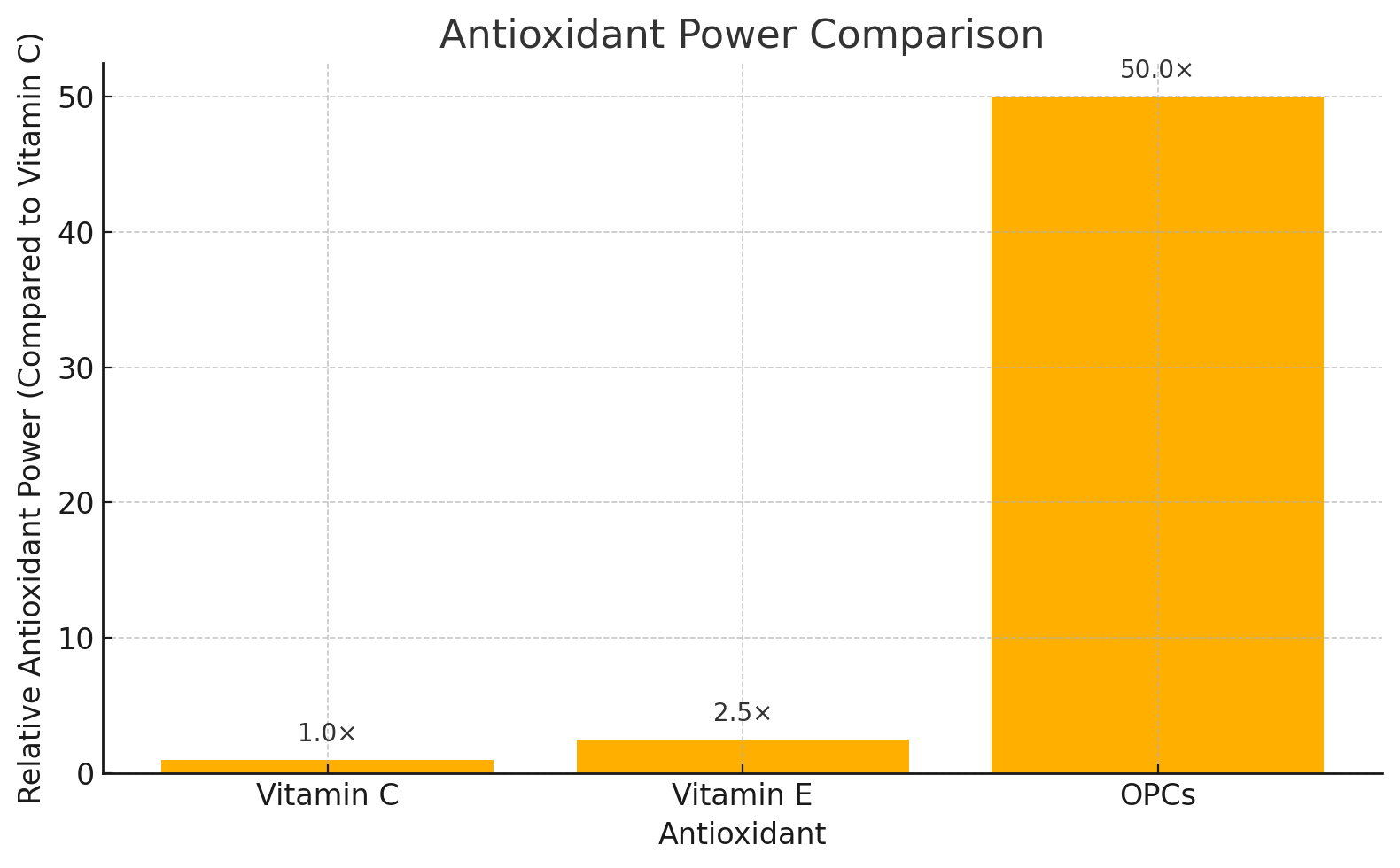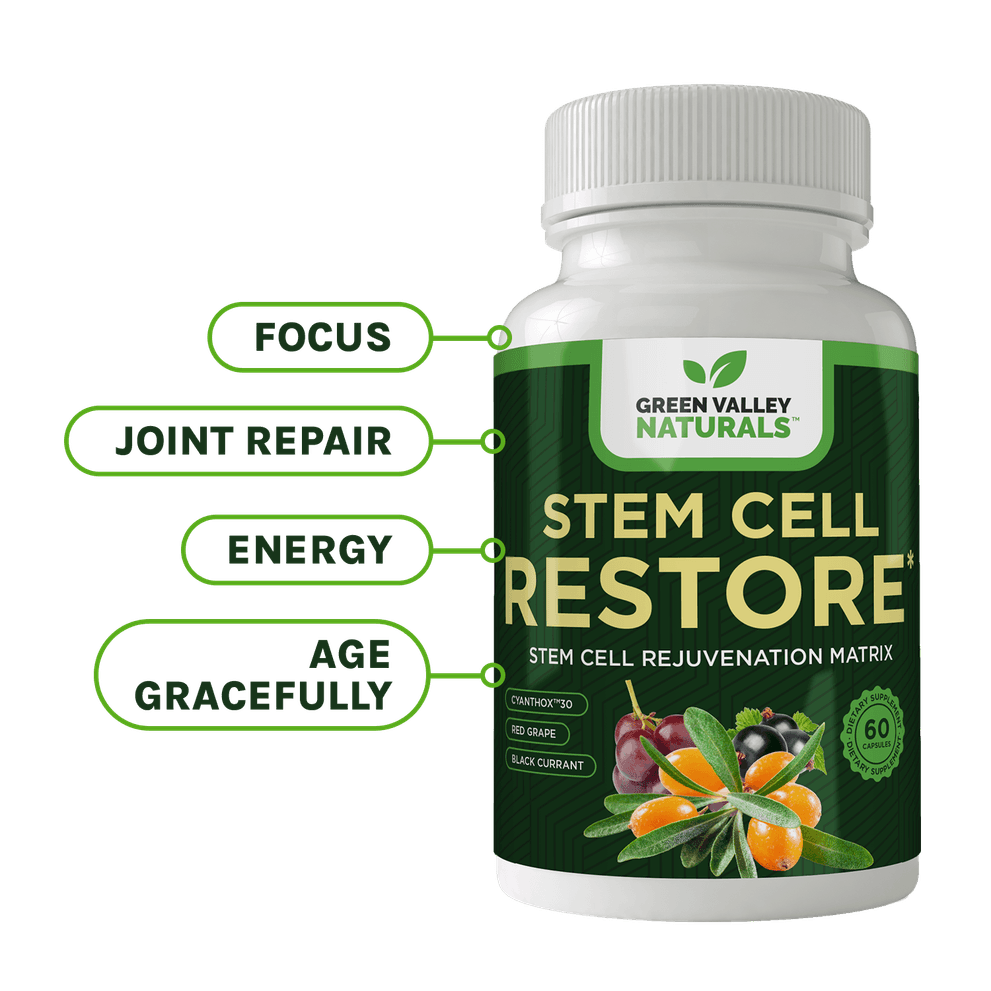
Ever found yourself standing in the supplement aisle, staring at a bottle of grape seed extract and wondering, "So... what exactly am I supposed to do with this?" You’re definitely not alone. You’ve probably heard someone rave about how it transformed their skin or helped their blood pressure, but the bottle just says “take as directed” with zero actual direction.
If you’ve been curious about grape seed extract but felt overwhelmed by conflicting information online, this guide is for you. We’ll cut through the confusion and give you the real deal on how to use this powerhouse supplement effectively—no PhD in biochemistry required.
Key Takeaways
Unmatched Antioxidant Power: Grapeseed extract is derived from the seeds of grapes, specifically Vitis vinifera, and is rich in antioxidants and oligomeric proanthocyanidin complexes which are up to 50× more potent than vitamin C, offering exceptional protection against oxidative stress and age-related damage.
Targeted Health Benefits: Depending on the dose, grape seed extract can support heart health, improve skin elasticity, enhance memory, support balanced blood sugar, and reduce chronic inflammation.
Smarter Supplementing: The form, dosage, and timing matter. Look for supplements standardized to 90–95% OPCs, pair with vitamin C, and avoid taking it alongside calcium or iron for best absorption.
What Exactly Is Grape Seed Extract? (And Why Should You Care?)
Picture this: after making wine, what happens to all those grape seeds? Instead of tossing them in the compost (which honestly seems like such a waste), smart scientists figured out how to extract the good stuff from them. That "good stuff" is grape seed extract (GSE), and it’s basically nature’s answer to aging, inflammation, and a whole bunch of other things our bodies deal with.
The magic lies in compounds called oligomeric proanthocyanidins—try saying that five times fast! Most people just call them OPCs, and here’s the mind-blowing part: they’re such powerful antioxidants that they’re about 20× stronger than vitamin E and 50× more potent than vitamin C when it comes to fighting the cellular damage that makes us feel (and look) older.

Now, don’t confuse this with grape seed oil that you might drizzle on your salad. That’s a completely different thing. We’re talking about a concentrated supplement that packs serious therapeutic punch.
The “Wait, This Can Really Do All That?” Benefits
Let’s be honest—sometimes supplement benefits sound too good to be true. But grape seed extract has actually been studied extensively, and the results are pretty impressive. Grape seed extract:
Helps Your Body Fight Premature Aging
One important way that grape seed extract can contribute to your fight against aging is the way that it helps stem cells function more effectively at repairing the body and producing new tissue. Much of this benefit derives from its natural chemicals known as procyanidins, which are classified as flavonoids. Studies show that procyanidins can help eliminate senescent cells—older cells that are malfunctioning and contributing to aging-related maladies. By helping to clean out these problem cells, the procyanidins pave the way for stem cells to increase their numbers and accelerate their regeneration and repair of the body’s organs.4
With the aid of procyanidins, those stem cells get to work more efficiently, and the body can more quickly fight off damage caused by the wear and tear of aging. Organs that are starting to slip get repaired. Other tissues get replaced. In general, the body gets rejuvenated. Those kinds of improvements are why some people look and feel great as they get older!
Supports Healthy Blood Flow—Your Heart Will Thank You!
Grape seed extract helps your blood vessels relax and improves circulation. Think of it as giving your cardiovascular system a gentle spa day. Studies show it can help lower blood pressure and protect your arteries from the daily wear and tear of modern life. Other studies show that the natural compounds in grape seed extract can also help you potentially live longer by acting as heart protectors—helping to keep the heart muscle in top-notch condition and staying on top of its game pumping blood around the body.5
For instance, a lab test in Europe demonstrates that procyanidins defend against harmful free radicals (oxidative molecules) that, if left to roam free, can damage heart cells. And research in Asia shows that having procyanidins circulating in your body defends against toxins like lead that can attack the heart. Lead has been linked to an increased risk of heart attacks, stroke, and blocked arteries. Plus, other studies have shown that procyanidins can keep the blood’s platelets less sticky and reduce the chances they will form harmful blood clots.
Is Your Skin’s Secret Weapon
Remember when you could bounce a quarter off your skin? Grape seed extract helps preserve collagen and elastin—the proteins that keep your skin firm and bouncy. It’s like having a time machine in supplement form, plus it helps protect against sun damage. Studies show that grape seed extract’s procyanidins protect collagen and elastin from UV damage, preserving skin elasticity and reducing wrinkles. Its antioxidants also mitigate sun-induced oxidative stress.7
Nourishes Your Brain and Memory
Here’s something cool—OPCs can actually cross the blood-brain barrier (which is notoriously picky about what it lets through). This means they can help increase blood flow to your brain and sharpen your mental clarity and cognitive function during aging.8
Lab investigations in Asia demonstrate that grape seed extract can reduce inflammation and oxidative stress in brain cells and thereby improve memory.13
Supports Blood Sugar Balance
If you’re dealing with the rollercoaster of blood sugar spikes and crashes, grape seed might help smooth out the ride by improving insulin sensitivity and lowering fasting blood sugar. A study in the journal Diabetes Care highlighted GSE’s role in regulating metabolic health and stabilizing blood sugar.9
Fights Inflammation
Consider that a big problem that arises during aging is “inflammaging,” the tendency for older immune systems to lapse into chronic inflammation. That process leads to damage and sickness as inflammatory immune cells attack the body’s organs. And here, too, grape seed extract can help.
For instance, a study at Rutgers indicates that grape seed extract possesses super-hero powers when it comes to quelling inflammation in your digestive tract. In these lab tests, the extract was shown to defend against inflammation of the intestinal lining and neutralize the destructive power of radical oxidative species. These unstable molecules can act as mini-blowtorches, burning through the intestinal wall. By addressing these radicals, the procyanidins in grape seed extract help maintain the integrity of the intestinal wall and prevent leaky gut.12
Chronic inflammation is like having a low-grade fire burning in your body. Grape seed acts like a gentle fire extinguisher, helping to calm things down naturally. Research shows that grape seed reduces markers of chronic inflammation (e.g., C-reactive protein, cytokines) in humans and animals. Its anti-inflammatory properties help mitigate inflammation associated with aging and illness.10
Helps Post-Surgery
If you’re facing any kind of procedure, grape seed can help reduce swelling and bruising afterward. Research suggests that grape seed reduces postoperative swelling and bruising in cosmetic surgery patients. It accelerates recovery by minimizing inflammatory responses.11
Navigating the Supplement Aisle: What Form Should You Choose?
Walking into a health store can feel like being dropped into a foreign country where everyone speaks “supplement.” Here’s your translation guide:
Capsules/Tablets: This is probably what you’ll see most often, and honestly, it’s usually your best bet. They’re convenient, pre-measured, and you don’t have to taste anything weird. Perfect if you’re already in the habit of taking other supplements.
Powders: These give you more control over your dosage and can be mixed into smoothies or drinks. Great if you like to customize things or if you have trouble swallowing pills. Fair warning: it doesn’t taste like grape juice.
Liquids: These might absorb faster, which could be helpful if you have digestive issues. Some people swear by liquid supplements, though they’re usually more expensive and have a shorter shelf life once opened.
Topical Creams: These are specifically for skin benefits—think of them as fancy face creams with extra antioxidant power. They won’t give you the systemic benefits for your heart or brain, but they’re great for targeted skin care.
What to Look For When Shopping:
Standardized extracts with at least 90–95% OPCs (this ensures you’re getting the good stuff)
GMP-certified or third-party tested brands (quality control matters)
Minimal fillers and no artificial colors (keep it clean and simple)
The Million-Dollar Question: How Much Should You Take?
This is where things get personal, because the “right” dose of grape seed depends on what you’re trying to achieve. Think of it like exercise—a casual walk has different benefits than training for a marathon.
For General Wellness: 100–300 mg daily is usually plenty. This is your maintenance dose for overall antioxidant support.
For Specific Health Goals:
Cardiovascular support: 150–300 mg daily
Skin health: 200–400 mg daily
Cognitive support: 300–600 mg daily
Post-surgery recovery: Up to 600 mg daily (but only short-term and with your doctor’s okay)
Timing Tips That Actually Matter:
You can take it with or without food (though some people find it easier on their stomach with food)
Consider splitting your dose—half in the morning, half in the evening—for better absorption
Consistency beats perfection. It’s better to take 200 mg every day than 400 mg sporadically
Grape Seed: How to Get the Most Bang for Your Buck
Here are some insider tips that can make a real difference in how well grape seed extract works for you:
Pair It with Vitamin C: This is like adding a turbo boost to your supplement. Vitamin C helps your body absorb and use the OPCs more effectively. You don’t need to take them at the exact same time, but having both in your routine is smart.
Timing Matters with Other Supplements: If you take calcium or iron supplements, space them out from your grape seed extract. These minerals can interfere with absorption—think of them as supplement bullies that push the OPCs out of the way.
Create a Routine: Your body loves consistency. Pick a time that works for your schedule and stick with it. Whether that’s with your morning coffee or before you brush your teeth at night, routine is your friend.
Timeline Expectations (because we all want to know “when will I see results?”):
Circulation and blood pressure improvements: 2 to 4 weeks
Skin changes: 6 to 8 weeks (be patient—good skin takes time)
Cognitive benefits: This varies widely depending on your brain function starting point
Grape Seed Extract and More in Stem Cell Restore
One of the best ways to enjoy the health benefits of grape seed extract is Green Valley Natural’s Stem Cell Restore. This anti-aging formula stands apart because it combines cutting-edge, standardized polyphenol extracts—like 95% OPC-rich grape seed extract—with potent CyanthOx™M 30 sea buckthorn phytocomplex, all in a cGMP & third-party tested formula designed to naturally support your body’s innate stem cell production and overall vitality.
Unlike generic antioxidant polyphenol grape seed extract supplements, this proprietary blend is scientifically formulated to promote cellular regeneration, boost immune health, and enhance cardiovascular and bone marrow stem cell activity.
Is Grape Seed Extract Right for You? The Honest Assessment
Grape Seed Extract Is Probably Great If You’re
Over 40 and starting to think more seriously about aging and health
Dealing with high blood pressure or poor circulation
Concerned about sun damage or skin aging
Looking for natural ways to support brain health
Generally healthy but want to add some extra antioxidant protection
You Should Probably Skip It (Or Talk to Your Doctor First) If You’re
Taking blood thinners like warfarin (GSE can amplify these effects)
Pregnant or breastfeeding (there just isn’t enough research on safety)
Under 18 (kids usually don’t need this level of anti-aging supplementation)
The golden rule: when in doubt, check with your healthcare provider.
Your Most Burning Questions, Answered
"Can I really take this every day forever?" For most people, yes. But if you’re taking higher doses (over 400 mg), consider cycling it every few months. Think of it like giving your body a brief vacation to reset.
"I’m impatient. How long before I actually notice something?" This isn’t like taking caffeine where you feel it in 20 minutes. Most people start noticing subtle changes around the 2–6 week mark, depending on what they’re taking it for. Skin improvements take the longest—your skin cells need time to turn over.
"Food or no food—what’s the verdict?" Either works! If you have a sensitive stomach, taking it with food might be gentler. If you have an iron stomach and prefer the convenience of taking it whenever, go for it.
"Can I mix this with my other supplements?" Generally yes, and it actually plays well with others. Vitamin C is its best friend. Just space it away from calcium and iron supplements by a couple of hours.
"Will this keep me awake if I take it at night?" Nope! Unlike caffeine or some B vitamins, grape seed extract won’t wire you. Evening doses are totally fine if that fits your routine better.
The Bottom Line: Making It Work for Your Real Life
Here’s the thing about supplements—they’re only as good as your ability to take them consistently. The most expensive, highest-quality grape seed extract in the world won’t do you any good if it sits in your medicine cabinet because you forgot to take it.
Start simple. Pick a time that fits into your existing routine. Maybe that’s with your morning vitamins, or maybe it’s something you take with dinner. There’s no perfect way—just the way that works for you.
And remember, supplements are called supplements for a reason. They’re meant to supplement a healthy lifestyle, not replace it. You still need good sleep, regular movement, stress management, and decent nutrition. Think of grape seed extract as a helpful sidekick in your health journey, not the superhero who’s going to save the day single-handedly.
The research on grape seed extract is genuinely exciting, and for many people, it can be a valuable addition to your wellness routine. Just approach it thoughtfully, start conservatively, and pay attention to how your body responds. Your future self—with better circulation, clearer skin, and a sharper mind—will thank you for taking the time to do it right.
Summary
In this article, How to Take Grapeseed Extract: A Guide to Benefits and Dosage, you learn how to take grape seed extract in the most beneficial way. Grapeseed extract is derived from the seeds of grapes, specifically Vitis vinifera, and is rich in antioxidants and oligomeric proanthocyanidin complexes. Grape seed extract can provide cardiovascular benefits, including amazing support to help the body reduce blood pressure and improve blood flow. The extract is available as a dietary supplement in various forms, including capsules, tablets, and liquid extracts. Grape seed oil, pressed from grape seeds, also contains beneficial compounds, but its health benefits are less researched. Grapeseed extract is a by-product of wine production and can be found naturally in grapes.
Frequently Asked Questions
How to take grape seed extract and why?
Grape seed extract has antioxidant and anti-inflammatory properties, which may help protect cells from free radical damage and provide many possible health benefits. The extract may improve circulation, reducing the risk of chronic venous insufficiency and other cardiovascular conditions. Grape seed extract may also have brain health benefits, including improving cognitive function and reducing the risk of age-related diseases. Some studies suggest that grape seed extract may lower cholesterol and improve overall heart health. The extract’s antioxidant effect may also help reduce inflammation and improve skin conditions.
Can my body absorb it?
Grape seed extract is well-absorbed in the body, with a bioavailability of around 50–70%. The extract’s absorption may be enhanced when taken with food, especially fatty foods. Some say grape seed oil may have a higher bioavailability than grape seed extract, due to its lipophilic nature, but that is not confirmed in research or in randomized controlled trials (the gold standard of scientific research).
What about natural vs. synthetic grape seed extract?
Grape seed extract is a natural product, derived from the seeds of grapes. Synthetic grape seed extract is not available, and the natural extract would likely be more effective. Grape seed oil is also a natural product, pressed from grape seeds. Natural products like grape seed extract may have a higher risk of contamination and variability in quality if you are not taking a supplement formulated under GMP (Good Manufacturing Practices) certification that is third-party tested.
What foods contain grape seed?
Grapes are the primary source of grape seed extract, and can be found naturally in red wine. Grape seed oil can be used as a cooking oil, and can be found in some food products. Grapeseed extract can be added to food products, such as energy bars and supplements. Foods containing grape seed extract may have a higher antioxidant content and potential health benefits.
Can you be deficient and what are symptoms of deficiency?
A deficiency in grape seed extract is not possible, but a lack of antioxidants in the diet may lead to oxidative stress and inflammation. Symptoms of oxidative stress and inflammation may include fatigue, skin problems, and digestive issues. Grape seed extract may help alleviate these symptoms, due to its antioxidant and anti-inflammatory properties.
4 Wang et al., 2018, Journal of Agricultural and Food Chemistry
5 Sano et al., 2019, Phytotherapy Research
7 Katiyar et al., 2017, Journal of Dermatological Science
8 Yamakoshi et al., 2019, Nutritional Neuroscience
9 Sano et al., 2020, Journal of Diabetes Research
10 Bagchi et al., 2018, Molecular Nutrition & Food Research
11 Cheng et al., 2017, Journal of Surgical Research
Stem Cell Restore
Increased Energy from Organic Tibetan Sea Buckthorn Trans-Resveratrol, Vitamin D




